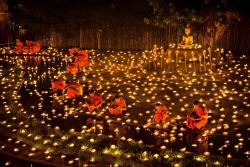Difference between revisions of "Insentient beings"
Jump to navigation
Jump to search
| Line 1: | Line 1: | ||
[[File:60968.jpg|thumb|250px|]] | [[File:60968.jpg|thumb|250px|]] | ||
| − | + | insentient [[beings]] | |
| − | [非情] (Jpn hijo) | + | [[非情]] (Jpn [[hijo]]) |
| − | Those beings or objects that have no [[emotions]] or [[consciousness]] , such as [[trees]] and stones. The term is contrasted with [[sentient beings]] , those forms of [[life]] that possess [[senses]] , [[emotions]] , or [[consciousness]] . [[Buddhism]] classifies all existences into two categories: sentient and insentient. A dispute arose in [[Chinese Buddhism]] with regard to whether insentient beings possess a [[Buddha nature]] , but the view that [[Buddhahood]] exists as a potential in all things and [[phenomena]] prevailed in [[China]] . This idea also became widespread in [[Japan]] . See also [[enlightenment of plants]]. | + | Those [[beings]] or [[objects]] that have no [[emotions]] or [[consciousness]] , such as [[trees]] and stones. The term is contrasted with [[sentient beings]] , those [[forms]] of [[life]] that possess [[senses]] , [[emotions]] , or [[consciousness]] . [[Buddhism]] classifies all [[existences]] into two categories: sentient and insentient. A dispute arose in [[Chinese Buddhism]] with regard to whether insentient [[beings]] possess a [[Buddha nature]] , but the [[view]] that [[Buddhahood]] [[exists]] as a potential in all things and [[phenomena]] prevailed in [[China]] . This [[idea]] also became widespread in [[Japan]] . See also [[enlightenment of plants]]. |
{{R}} | {{R}} | ||
Revision as of 00:31, 28 September 2013
insentient beings
Those beings or objects that have no emotions or consciousness , such as trees and stones. The term is contrasted with sentient beings , those forms of life that possess senses , emotions , or consciousness . Buddhism classifies all existences into two categories: sentient and insentient. A dispute arose in Chinese Buddhism with regard to whether insentient beings possess a Buddha nature , but the view that Buddhahood exists as a potential in all things and phenomena prevailed in China . This idea also became widespread in Japan . See also enlightenment of plants.
